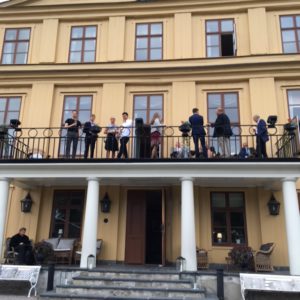(Original Swedish post published 24 August.)
The Management Council* meets at the beginning of each term for an overnight conference. It gives us a chance to discuss strategic issues, to plan the year ahead and to get to know one another a bit better. It was particularly pleasing that all our new student representatives – regular members and alternates – were able to attend. This time, the meeting, from lunchtime on Wednesday to lunchtime on Thursday, was at Krusenbergs herrgård just outside Uppsala.
The agenda focused on a single issue – fundraising. Fundraising concerns how the University can increase donations and contributions to our education, research and other activities, such as investments in buildings. This is nothing new at Uppsala University. In 1624, the University received a donation from King Gustav II Adolf. Over time, we have received more donations and we currently have 605 foundations, which are managed by Uppsala University Foundations Management of Estates and Funds. The returns on these investments enable the University to fund research initiatives and provide scholarships for students. They also fund the maintenance and development of our cultural heritage in the form of the Botanical Garden, Museum Gustavianum, the Royal Academic Orchestra, our conferment ceremonies and other academic ceremonies, and much, much more besides.
To enable the University to increase our freedom of manoeuvre and our control over our own affairs, we have decided to develop our fundraising activities. Last year we therefore established a new division of the University Administration – the Development Office. The Head of the Development Office, Agnetha Stålhandske, and her staff had prepared a programme for our meeting. We started with an inspiring lecture from Mikael Horal, who was in charge of Karolinska Institutet’s successful fundraising campaign. He generously shared his experiences with us and gave us some useful tips for our ongoing efforts. Fundraising is a task that must involve the entire organisation and we need to have patience, as it takes time.
Ahead of the meeting, the disciplinary domains had drawn up proposals on a range of projects and purposes. At the end of the first day, the three vice-rectors presented the projects in their domains. Many were relevant to more than one domain and offer opportunities for collaboration across domain boundaries. The presentations served as the basis for an intense and exciting discussion on the second day, aimed at ranking and clustering the projects.
The University Management will now pursue these ideas further, proceeding from the discussions at the overnight conference. One of the steps will be to obtain an outside perspective by asking for comments from an external reference group.
Thanks to everyone for their commitment, the energy of the discussions and all the informative material on projects from departments and research teams.

*The Management Council advises the Vice-Chancellor and consists of Vice-Chancellor Eva Åkesson, Deputy Vice-Chancellor Anders Malmberg and the three vice-rectors Torsten Svensson, Stellan Sandler and Johan Tysk. Deputy vice-rectors Anna Singer, Mats Larhed and Marika Edhoff substitute for the vice-rectors when necessary and always take part in the overnight conferences, as does University Director Katarina Bjelke. Three student representatives, currently Ludvig Lundgren (Uppsala Student Union), Andreas Gustavsson (Uppsala Union of Engineering and Science Students) and Carl Andersson Kronlid (Doctoral Board), also participate, along with alternate members, currently Anna Liliebäck (Law Students’ Association in Uppsala), Christopher Lin (Uppsala Business & Economics Students Association) and Ernst Andersson (Pharmaceutical Student Association). Linda Lundberg is the secretary and Director of Communications Pernilla Björk and Deputy University Director Kay Svensson also attend the meetings. The Management Council meets every other Monday.
